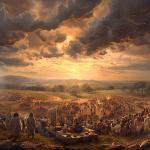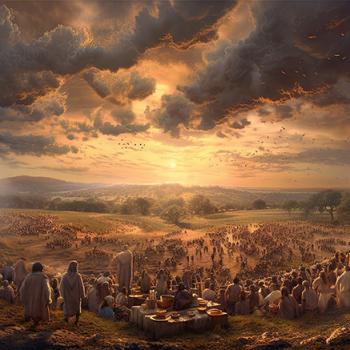
The solution to the problem of evil is the concept of the “amipotence” of God, which defines God’s chief attribute as uncontrolling love rather than almighty power. The following is the first half of my essay from Amipotence, Volume 2, Expansion and Application, the second of two volumes on amipotence inspired by Thomas J. Oord and now available on Amazon. To see my blogs on a critique of the problems with the concept of omnipotence see 10 Serious Problems with an Omnipotent God.
___________________
Amipotence: The Ghost Buster of Harmful Doctrines
Trust in an amipotent God frees us from frightful and damaging doctrines.
Traditional modern Christianity has many serious problems. The primary one is this: Christianity, the way most of us think of it (whether we are conservative, evangelical, progressive, or liberal), did not exist until about 200 years after Jesus (Erin Vearncombe et al, After Jesus Before Christianity). Most versions and doctrines of post-ancient and modern Christianity do not align with the original Jesus movement.
Another conundrum is what philosophers call “the problem of evil.” The God of Christianity is supposedly both all-powerful and all-loving. Yet, how can God be altogether loving if he does not prevent needless human pain even though he has the power to do so? How can an omnipotent loving God allow debilitating diseases, natural disasters, extreme poverty, sexual assaults, devastating wars, and a 20th-century holocaust? Why must the innocent endure unnecessary misery if an almighty God truly loves them? Some theologians try to get God off the hook by blaming evil on humankind’s sinful nature, our free will, and God’s higher purposes. But these do not hold up to careful scrutiny. At the end of the day, an omnipotent God could intervene to protect people from untold suffering, yet he does not.
The solution to this is twofold. One, get back to the original historical understanding of the earliest followers of Jesus, to Jesus himself, to the Jewish prophets, and to the original language of the scriptures. Second, is to deconstruct this notion that God is omnipotent. Thomas Oord and other open and relational theologians have explained this second solution quite well. Their conclusion? God is not all-powerful. God is not omnipotent. Yet neither is God impotent. Rather, God is all-loving (amipotent), meaning God mainly influences humanity through the vehicle of love. God’s chief attribute is not power but rather love.
God doesn’t want to be worshiped and feared more than anything. He wants to love humanity more than exert power and demand loyalty. This kind of love requires certain things. It requires that others have power, not just God. It requires that it not force its own way. So, it doesn’t control others. It’s uncontrolling love. “God does not control creatures or circumstances, because love is inherently uncontrolling” (Oord, The Death of Omnipotence and the Birth of Amipotence, 127). In addition to this, per Jesus’ example found in the gospels, this inherently uncontrolling love is selfless, humble, merciful, and nonviolent. And, because God is not impotent, it is profoundly influential. It doesn’t use almighty power, coercion, or brute strength to persuade others. It primarily uses kindness, love, and compassionate correction. It can even use weakness to influence humanity. As the Apostle Paul said, God’s strength is made perfect in weakness (2 Corinthians 12:9).
Applying Amipotence to History and Harmful Doctrines
Let’s say for the sake of argument that it’s true that God is not an all-powerful, omnipotent God and that God is amipotent as described above. How could we apply that to the historical biblical record and certain dogmas like original depravity, retributive and frightful notions of God, penal substitutionary atonement, and the doctrine of hell? Let’s see how these dogmatic ghosts hold up in the face of an amipotent God.
God is not omnipotent in the Bible
If God is amipotent and not omnipotent, why are there so many passages in the scriptures that say God is almighty and all-powerful? Well, actually, there aren’t. Examination reveals that there are numerous mistranslations of terms. There really isn’t any textual case for the belief that God is all-powerful in the Bible. There are three words that are translated as “almighty” in relation to God. The first is the Hebrew term, El Shaddai, typically translated as “God Almighty.” Yet, the oldest and most plausible meaning of Shaddai is “breast,” meaning the breasted God who nourishes and protects. It is not an all-powerful God. The second Hebrew word is Sabaoth. It is sometimes translated as “almighty.” Yet its meaning is “forces”, “armies”, “hosts”, “ranks”, “congregation”, or “council.” It would be better translated as “lord of hosts” or “head of a council.” The third term is the Greek word, pantokrator, which first occurs in the Greek Septuagint version of the Old Testament. It is best translated “all-holding” or “all-sustaining.” It does not mean “almighty.”
Thomas Oord declares this is true even in the New Testament: “…New Testament writers… do not use words that mean ‘omnipotent,’ ‘almighty,’ or ‘all-powerful’…” (Oord, The Death of Omnipotence and the Birth of Amipotence, 25). Jesus never called God omnipotent. God is described as powerful in the scriptures, but never all-powerful. God alone can do much, but he can’t singlehandedly do it all. If God is not called omnipotent in the Bible or in Jesus’ teachings, then the notion of omnipotence is a misguided teaching that crept into Christianity in the centuries after Jesus.
Amipotence requires uncontrolling love in the garden and beyond
Going back to the original ideas found in the first-century Jesus movement, original sin was not a state of sinful depravity inherited through Adam. The notion of original depravity for all humankind—that all people are born incapable of being good and require a religious conversion to be saved—first found its voice through Augustine in the 4th century, not with Genesis, Jesus, or Paul. Moreover, if God is amipotent, if uncontrolling love is his chief attribute, then original depravity can’t be true. How can God’s inherent nature be uncontrolling and God create humankind to inherit a depraved sinful nature they have no control over? If original depravity is true, then God ordains humans to lack goodness and be deserving of hell right from the start.
But if God is not all-powerful and his chief attribute is loving others without controlling them, then whatever sin or immaturity that humankind has is not from God imposing it. It’s simply a choice humans make. Therefore, God’s amipotence reinforces the original notion of human creation, that God made humankind in the image of God and that image is good. Humankind has original innocence albeit in an immature state. God does not bind us to be depraved but naturally gives us our own choice and power to act good or not.
Amipotence demands nonviolent love over retribution
In the traditional view of God, God is the Lord Almighty of all who rewards obedience and punishes sin and rebellion. He uses his own power or human governments to carry the punishment out. This punishment is retributive. In the here and now, it takes the form of personal devastation, disease, banishment, fines, imprisonment, and sometimes the death penalty. Yet, if Jesus’ compassion, mercy, forgiveness, and nonviolence is the true divine pattern and God is uncontrolling and doesn’t use power or sickness or violence to punish people, then these retributive devices can’t be from God. If they occur, they are from the natural consequences of one’s actions in the culture in which one lives. Or they are merely the consequences of living in a world full of natural risks. Uncontrolling love does not seek retribution because the act of retribution is the ultimate control of another. Uncontrolling love seeks to influence others to change. It doesn’t manipulate, restrain, force, threaten, punish, inflict pain on, torture, or execute another.
________________________________
The bottom line is that God, in his core character of uncontrolling love (rather than omnipotence), cannot be the one who causes or allows evil to prevail in the world. Evil comes from human choices or “the consequences of living in a world full of natural risks.” If God is not omnipotent, then he can’t be blamed for “the problem of evil.” Stay tuned for the second part of this essay in another post that further explores how amipotence is the ghostbuster of harmful doctrines.
***********
Michael Camp tends the Spiritual Brewpub, which helps disillusioned or post-evangelicals uncover historical facts and insights that help them deconstruct, rethink, and rebuild a more authentic faith or spirituality. He is the author of Breaking Bad Faith: Exposing Myth and Violence in Popular Theology to Recover the Path of Peace. To get specific help deconstructing conservative Christianity and rebuilding healthy faith, see Michael’s Religious Deconstruction Workshop.














